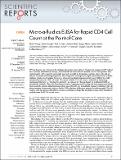Micro-a-fluidics ELISA for Rapid CD4 Cell Count at the Point-of-Care
Author(s)
Wang, ShuQi; Tasoglu, Savas; Chen, Paul Z.; Chen, Michael; Akbas, Ragip; Wach, Sonya; Ozdemir, Cenk Ibrahim; Gurkan, Umut Atakan; Giguel, Francoise F.; Kuritzkes, Daniel R.; Demirci, Utkan; ... Show more Show less
DownloadWang-2014-Micro-a-fluidics ELISA.pdf (1.295Mb)
PUBLISHER_CC
Publisher with Creative Commons License
Creative Commons Attribution
Terms of use
Metadata
Show full item recordAbstract
HIV has become one of the most devastating pathogens in human history. Despite fast progress in HIV-related basic research, antiretroviral therapy (ART) remains the most effective method to save AIDS patients' lives. Unfortunately, ART cannot be universally accessed, especially in developing countries, due to the lack of effective treatment monitoring diagnostics. Here, we present an inexpensive, rapid and portable micro-a-fluidic platform, which can streamline the process of an enzyme-linked immunosorbent assay (ELISA) in a fully automated manner for CD4 cell count. The micro-a-fluidic CD4 cell count is achieved by eliminating operational fluid flow via “moving the substrate”, as opposed to “flowing liquid” in traditional ELISA or microfluidic methods. This is the first demonstration of capturing and detecting cells from unprocessed whole blood using the enzyme-linked immunosorbent assay (ELISA) in a microfluidic channel. Combined with cell phone imaging, the presented micro-a-fluidic ELISA platform holds great promise for offering rapid CD4 cell count to scale up much needed ART in resource-constrained settings. The developed system can be extended to multiple areas for ELISA-related assays.
Date issued
2014-01Department
Harvard University--MIT Division of Health Sciences and TechnologyJournal
Scientific Reports
Publisher
Nature Publishing Group
Citation
Wang, ShuQi, Savas Tasoglu, Paul Z. Chen, Michael Chen, Ragip Akbas, Sonya Wach, Cenk Ibrahim Ozdemir, et al. “Micro-a-Fluidics ELISA for Rapid CD4 Cell Count at the Point-of-Care.” Sci. Rep. 4 (January 22, 2014).
Version: Final published version
ISSN
2045-2322